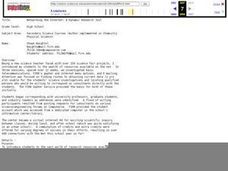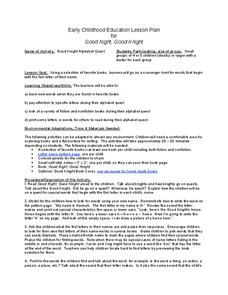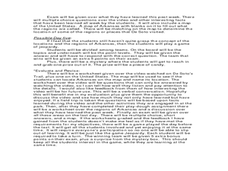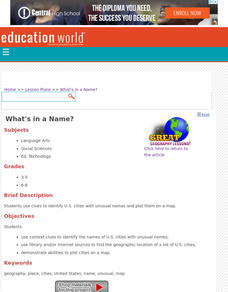National Council of Teachers of English
Writing Acrostic Poems with Thematically Related Texts in the Content Areas
Scholars scour thematically aligned texts to gather a bank of words they can use in an original acrostic poem.
Curated OER
USING MICROSOFT, POWERPOINT, WORD, EXCEL AND THE INTERNET TO CREATE A PRESENTATION
Explore the basic PowerPoint commands and options. They research information (including the WWW) related to an approved topic for presentation development. They create a presentation defined by specific criteria. They document research...
Curated OER
Networking the Internet: A Dynamic Research Tool
Learners engage in a lesson that is concerned with the research of finding information to help them develop new science projects. They conduct research using a variety of resources that includes e-mail and discussion groups.
Facing History and Ourselves
The Legacies of Reconstruction
The final instructional activity in the seven-resource Reconstruction Era collection examines the legacies of Reconstruction. Class members investigate why the period has been called an "unfinished revolution," "a splendid failure," and...
John F. Kennedy Center
Harriet Tubman: An Informative and Impressionistic Look
Informational text and impressionistic art lead a lesson about Harriet Tubman. Working in teams, scholars examine a variety of resources. They analyze, compare, and contrast the work. Using their research findings, pupils create an...
Facing History and Ourselves
After Charlottesville: Public Memory and the Contested Meaning of Monuments
Are Civil War monuments a kind remembrance or a reminder of a dark past? The lesson focuses on the public's memory of the Civil War and the monuments that represent it. Young academics explore past efforts to change historical symbols...
Scholastic
Perfect Postcards: California
It's time to hear about some adventures in travel! The Transcontinental Railroad changed life and travel in the United States during the 1800s. Practicing online research skills, pupils discover the features they would like to visit on...
Penn State
Early Childhood Education Lesson Plan for Good Night, Good Knight
The book Good Night, Good Knight is the inspiration for this plan. Learners get into small groups to search for words in books that begin with their names and fill out and illustrate their own personal letter and name pages.
Facing History and Ourselves
Responding to Difference
James Berry's poem, "What Do We Do With a Difference?" launches a lesson that asks class members to consider the ways people respond when they encounter someone different from themselves. After analyzing the poem and discussing how they...
Facing History and Ourselves
A Contested History
Memories of and interpretations of history change—that's the key takeaway from a lesson that has young historians compare the story of the Reconstruction Era as told by the historians of the Dunning School to the view of scholars today...
Facing History and Ourselves
Identity and Names
Would a rose smell as sweet, as Juliet Capulet asserts, if called by any other name? The importance of names and the connection between names and identity are examined in a lesson that explores identity in the United States. After...
Facing History and Ourselves
Protesting Discrimination in Bristol
Using the Bristol Bus Boycott as a case study, class members examine the strategies and levels of power protesters used to effect change. The two-day instructional activity concludes with individuals reflecting on the actions they might...
Facing History and Ourselves
The Costs and Benefits of Belonging
Peer pressure and the desire for acceptance are powerful things. A thought-provoking lesson looks at the positive and negative effects of wanting to belong to a group. Class members examine the roles of the perpetrator, the victim, the...
Facing History and Ourselves
California Grape Workers’ Strike: 1965–66
The California grape workers' strike of 1965-66 is the focus of a lesson that asks high schoolers to investigate the strategies farmworkers used to organize and gain contracts with grape growers that ensured higher waters and better work...
Facing History and Ourselves
Finding Your Voice
To begin a study of what it means to be American, high schoolers first consider their own identities. They draw a picture of what they think an American looks like and share their images. Next, they examine an image of the "Flag of...
Facing History and Ourselves
Identity and Choices
Timshel! Thou mayest! is the big idea in a lesson that reminds learners that they have choices about how they present themselves to others. To begin, individuals rate the degree to which the choices they make each morning are influenced...
Curated OER
Reference Resources: Being a Good Detective
Learners explore a variety of reference resources while seeking information. atlases, almanacs, dictionaries, encyclopedias, thesauri, and online search engines as well as library card catalogs are utilized in this instructional activity.
Curated OER
Railroad Idioms Art Lesson Plan
Sixth graders research railroad idioms. In this idiom lesson, 6th graders read through a glossary of different railroad idioms and their meanings. They illustrate a chosen idiom.
Curated OER
Arkansas History Lesson Plant One: Play-Do Soto
Fifth graders complete a variety of projects to learn about Arkansas history. In this Arkansas lesson plan, 5th graders go on a field trip to a state park, explore an Arkansas map, put play-dough on the trail of De Soto, color regions of...
Curated OER
What's In a Name?
Students examine the origins of the names of U.S. states, focusing on names that were derived from Native American words. They are provided with lists of the names of the 50 states, and then research online or in library resources the...
Curated OER
1920s Variety Show
To better understand the cultural achievements of the Harlem Renaissance and become familiar with its major figures, class members examine a painting by Aaron Douglas and a poem by Langston Hughes and compare how the artists develop...
Curated OER
Red Dirt Groundbreakers
Discover Oklahoma's first farmers. Read about 14 different agriculture workers and their contribution to Oklahoma's farming. After reading, have your class complete several activities such as researching an agriculturist, writing a...
Curated OER
Fossil Fuels vs. Alternative Fueling Systems
Fourth graders brainstorm the differences between the fossil fuels that people use in their transportation now and what they could use to minimize greenhouse gas emissions. They use a variety of techniques from webquests to writing...
Curated OER
Searching in "Neat Stuff": Library Corner
Students explore collections of materials and pointers to other related materials to help them to quickly and easily find and retrieve information needed. This lesson was originally written for librarians with little or no net experiences.

























